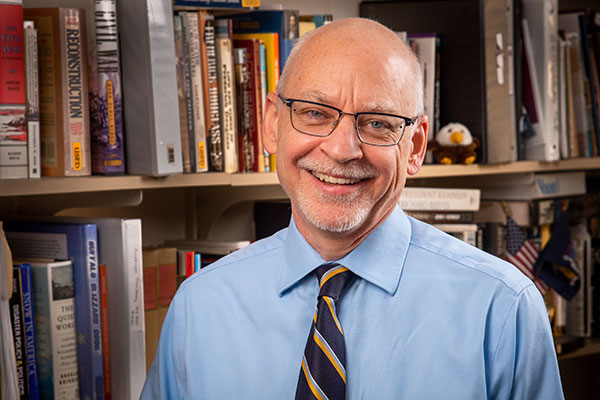Background and expertise
I came to Nazareth in 2000, after a dozen years teaching in the Midwest. My teaching interests include:
- American politics and the presidency
- natural disaster studies
- epidemics and pandemics
- museums, archives, and public history
I’ve had the opportunity to write on a number of topics from history to politics to science in encyclopedias, journals, newspapers, textbooks, and monographs. Some of my favorite writings:
- natural disaster studies of Hurricane Agnes in 1972 and the Blizzard of 1977 in Buffalo, N.Y.
- an article on a 19th-century American scientist who became a spiritualist and tried to scientifically prove the existence of spirits
- studies of presidents Millard Fillmore, Franklin Roosevelt, and George H. W. Bush
- the first historical study of electro-convulsive shock therapy ever published
Democrats, Republicans, and natural disasters
I have delved into contemporary politics with a book on how Democrats and Republicans view social issues — a balanced look at the different worldviews and perspectives of the two major American political parties. I also have explored the intersection of politics and natural disasters in books on Hurricane Agnes and the Blizzard of 1977.
Learning by doing
My classes are often full of experiential learning components such as:
- building a database about people buried in the Pittsford Cemetery, for American Republic II
- field experiences in Natural Disasters
- building websites and creating apps or historical tours in Public History
- conducting political management and get-out-the-vote activities in Campaigns, Voters, and Elections
- and more, as described on our Center for Public History webpage
I want students to learn by doing. However, I also layer that experience with thoughtful and reflective research by scholars — so there is always much to read in my classes, from professional journal articles to textbooks to novels.
My academic passion
My history and political science courses tend to focus on power in its various forms — social, cultural, and political.
Courses I teach
My favorite course always seems to be the one I am teaching at the given time.
- American Women’s History
- American Presidency
- American Republic II
- Pandemics and American Society
- History of Science in America
- Disasters in American Society
- Public History
Changing lives
What makes Naz unique is that we all have the common goal of changing lives. We want to work alongside students and help them achieve their goals, and at times we help students identify those goals. Students don’t just take classes at Naz, they work with professors. Teaching is not transactional, it’s relational.
How students can best prepare for working in history or politics
Students need to experience history and politics, not just study them. Volunteer with a historical society or political party; be sure to do at least one internship while at Naz. Study abroad to see how other people view the U.S.

Media regularly seek Prof. Kneeland for his savvy political analysis — such as on CNN about hurricane recovery becoming a political focal point. He's equally passionate about history.
Provokes deep thought
"Dr. Kneeland's lectures are unique in that they are more of a conversation with the whole class where debate and questions are always encouraged and flow freely. The answers aren't necessarily in a textbook and provoke deep thought, ultimately boosting your skills and confidence in analysis. A few years after I took his course on natural disasters, I was a caseworker for all Federal Emergency Management Agency (FEMA) and disaster-related issues for Rep. Slaughter, so the course really had real-world application for me. His American Presidency course was just a total blast."
— Katie (LaShomb) Condello '10, political science major and philosophy minor who's gone on to work as community liaison/press assistant for U.S. Congresswoman Louise M. Slaughter
Fun Fact
Students might be surprised to know that I once had my own radio show in Greenville, Illinois.
Passion for history
“Dr. Kneeland introduced me to the field of public history. I had never considered the unique challenges and opportunities presenting history to the public might bring. His passion for history and belief that it is the duty of historians to engage and educate inspired me to pursue a job where I could do just that. He has supported me every step of the way — even after I graduated from Nazareth and pursued my master’s degree. I knew I could always send him an email seeking his advice and opinion and would get a response.”
— Adam Bradford ‘13, history major, a part-time historian at Holy Sepulchre Cemetery who went on to complete a master’s degree in American history with a public history focus
Faculty Spotlights
Wondering who else you can learn from — and who will support and challenge you? Check out Faculty Spotlights.
Lessons in disaster
I use the study of natural disasters and pandemics to teach important lessons about the nature of government, policy-making, and American culture.
- Read my essay on this issue
- Buffalo Blizzard of 1977 book, published 2017, captures how people helped each other to get through it
- Lessons Learned: Comparing 1918 Flu Pandemic to 2020 COVID-19